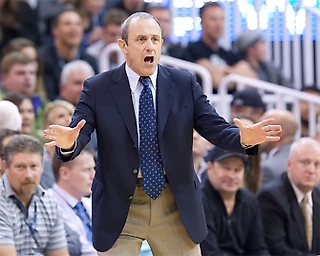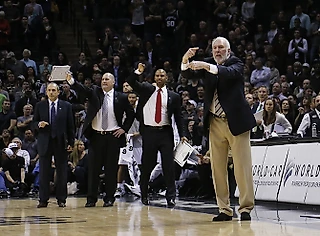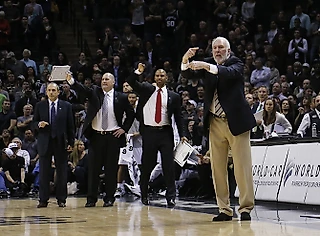Handling losses
When we go to Italy, I always want my team to play well. Many friends of mine and many colleagues of mine come to see my team. This time we played well for 20 minutes only. I was extremely upset.
Our loss to Milano was the cause for many rumors, because Milano is not even at the top of our Euroleague group. We were up by 20 points at the end of the first half. It seemed like we had control over that game. We started the second half poorly allowing them to cut the deficit to 8-10 points. We got nervous and couldn’t focus on what we had to do. While we were lucky in Belgrade being able to defend 1-point advantage in the last seconds, we were unlucky in Milano as we turned the ball over in the last possession. We lost the game that, in my opinion, we deserved to lose anyway. Obviously, you’re never happy when you lose a game, especially when you lose like that. I’d prefer to start bad, play bad and lose rather than play well in the first half and then lose after a horrible second half.
I cannot say that I’m great at handling losses. I’ve been lucky to work with teams and organizations that lose rarely. Every loss is painful. But if what we planned in terms of reading the game, in terms of defensive or offensive strategy was proven wrong, I consider it like a personal defeat. I feel like I failed to help my players to perform the best possible way. It’s true that I’m often upset with our players if we lose, but in those cases I’m much more upset with myself. This is why for the next practices we try to come up with something to correct the mistakes we’ve made.
The most difficult part comes after the game when you have to understand whether what we have decided to do was correct and it was just the matter of poor execution, or we should have done something differently.
I felt extremely responsible for the loss in Milano, because we knew they will use full court pressure against our tall point guards, Zoran and Nikos, who can have troubles against shorter and more aggressive players. We should have dome something to help them by involving more players in bringing the ball up court and organizing the offense. This is what we did in the game with Khimki and especially in the game with Panionios. The fact that we did it well during two following games proved that I was wrong because I didn’t prepare anything to help them in the game with Milano.
Even during preparation for this game I was not completely aware that it might be a problem without J’s quickness at point guard position. By organizing that kind of help for Nikos and Zoran, we could have helped them to put more pressure on their opponents close to the basket with their size and their abilities. After a good first half I thought that the problem was not going to arise. I also made a mistake during our last possession when I asked Ramunas, who was tired, to attack against Hawkins who is extremely quick and strong in defending one-on-one. We could have taken advantage of some other mismatch that we had on the court at the moment. Those are small things that very few could notice, but I have to be aware of them.
The most important thing after a loss is not to lose perspective. We cannot consider ourselves an unbeatable team. We could not expect to win every game. It’s true that every once in a while you need to lose a game just to get back to reality. The following two games with Khimki and Panionios were a great relief. This loss to Milano was what I call therapeutic loss, a loss that forces the team to refocus, push the team to work even harder while not affecting the standings seriously.
Losing a game can also affect your confidence. I’m always extremely concerned about the level of confidence that my team has. The confidence our players have in themselves, the confidence they have in their teammates, the confidence they have in the coach, the confidence they have in team’s capability to be successful throughout the season. As we are all responsible people, losses always hurt team’s confidence, confidence of any individual. Especially the loss in Milano, when we know we were superficial and couldn’t give more attention and more desire when it was needed.
In the first half with Khimki, a team that had a great motivation due to the change of coach and all the criticism after their recent losses, we played extremely insecure. We lacked confidence. We missed some good shots and we were not playing our game. It took us more than 20 minutes and a great effort from some of our leaders to turn that situation around. When they managed to push themselves and their teammates to a higher level, our game flourished and we came up with a great second half winning by big margin.
Confidence is one of the most important things in whatever activity you are involved at. Your confidence in people that surround you and your confidence in yourself. This is why I’m always very careful about the way we handle losses. Handling it the wrong way could be destroying not in the short term, but in the long term. Losses put you in the position when you start to question yourself and what you’re doing.
After struggling with Real Madrid, after almost losing to Partizan, after wasting a big lead and losing to Milano, after struggling until the last quarter in Vladivostok, I think it is the time to focus on one specific issue. Are we capable to win on the road? Are we capable to overcome the toughness of the road game? To be a winning team, you need to win on the road. It’s very dangerous to assume that you can reach the final or win a championship relying only on home court advantage. Home court advantage is very important. It gives you ability to play more relaxed and more confident on the road, because it puts additional pressure on the home team.
To win on the road you must be extremely consistent and pay attention to many little things, like not allowing three point plays (basket and a foul). By the way, we allowed 7 such baskets in Milano which is an average rate for a junior/cadet team with inexperienced young players who don’t know how to foul properly. With Khimki we allowed only one such basket. Thus in Milano we gave the opponent the possibility to score 7 more points. We also missed 9 of our free throws. Those are additional 10-15 points we could have, if we paid more attention to little things.
There is one very important thing that I learnt from the coaches who I was fortunate to work with. You must learn to win games even if you don’t play well. After the game with Milano I told my players that we had won most of our games because we started well from minute one and we didn’t stop until the end. But in Madrid, in Belgrade, in Milano, in Vladivostok, we didn’t start the best possible way or we weren’t consistent enough which resulted in close situations at the end of the game. We need to find a way to turn games around with confidence, mental toughness, even if we start the game poorly. That’s why I was extremely happy in Khimki. We had a bad start and a bad first half, but our players were able to refocus, to understand what they have to do better, all by themselves. Most of our veterans stepped up in the crucial second half to lead the team to a great win.
I believe that if one, two or three players are not playing well, everything is still possible. But when you have a game like the one we had in Milano when everybody was playing unfocused or when everybody played concerned like in the first half with Khimki, that’s my responsibility. This is why I feel personally responsible for that loss. I’m just lucky that my team is made with strong players and strong personalities who can overcome the problems even by themselves.
I almost never use the expression “bad night”. One of the things that struck me as a high school student when I was studying Latin was a quote by a famous Roman poet: “You are responsible to build your own future”. In our mentality, in our philosophy, we are brought up to believe that fate plays a major role in our lives. I do believe that fate, good or bad luck can affect your life. Nobody knows about the future, nobody knows why we get sick, survive or die. But you should be prepared and limit the impact of the fate, wherever you have the possibility to do so — for example, in your work. You have to do your best. An injury is something we cannot predict, but we can do something to prevent the injury. The same thing with having a ‘bad night’. You might have a bad shooting percentage, but there are always reasons to it like bad passing, bad execution or bad attitude. Even in a bad night you can develop a routine that helps you to go through a bad night and still try to find the way to make it. That’s probably one of the most exciting things to do as a team — to find a way to make it through the bad night without accepting the bad luck and fate, without making excuses.
When we watch a tape together and go over a game, I can be extremely severe when pointing out what we did poorly, especially if the reason is our carelessness. At the same time I’m very concerned about the confidence of our players. I try to point out what we can do better in order to gain more confidence in one another. It’s a correct way to point out mistakes. I think the players appreciate this, because it’s not always their responsibility, but our responsibility as a group. I honestly admit that I’m much more aggressive when things are going well or after a win, than after a loss. After a loss I know that we are in a tough moment, that we are stressed and vulnerable. This is why I should not be too aggressive.
With experience you have to develop the ability to feel the mood of the team. Sometimes the team reminds me of my son Filippo when he does something wrong and he expects that Mum and Dad will say something or react to his mistake or his behavior. From time to tme we have to surprise him by not reacting the way he expects us to react. The same thing can be applied to the team. The team needs to be supported, sometimes surprised and sometimes they need to be pushed. We cannot say that we always do the right thing, but together with David, Lele and Dima, I hope, we’ve reached a good level of understanding of what kind of mood the team is in. If you don’t understand it and don’t take it into consideration, you might sometimes unintentionally reinforce overconfidence or reinforce a lack of confidence.





I wouild like to teii you THANKS A LOT for your artickles. I am aiways finding here a iot of smarts moments which helps me to perfect my basketball conseption. You are greatest coach to, my mind, not just a results, i am about your abilities to share your ideas. Your work is really useful. Do not stop.
Good luck.
However, couldn’t keep the thought Papaloukas is irreplacable (at least for now) out of my head.